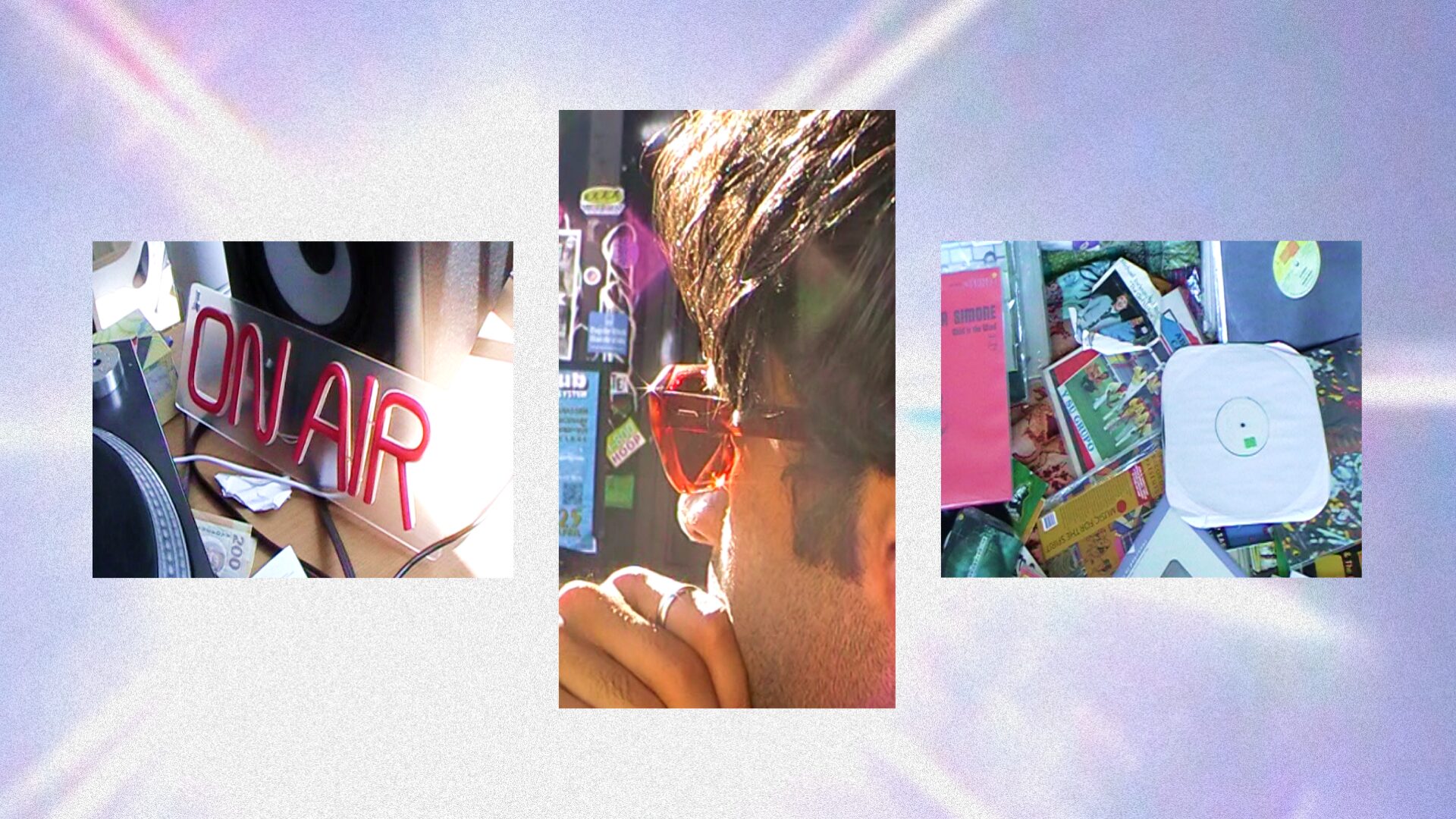It’s a sweltering day in East London when Haseeb Iqbal emerges onto Gillett Square in Dalston, sipping from a coconut, the hum of NTS Radio buzzing nearby. Before our interview begins, a football appears, and we’re suddenly mid-kickabout with a few locals. Not exactly how I imagined our conversation going, but with Haseeb wearing an Arsenal shirt, it’s perfectly on brand.
Iqbal embraces the unorthodox. Throughout our time together, we move from showcasing football skills to weaving through Ridley Road Market, where he inspects fruit and veg like a crate digger in a record store. His curiosity is constant, deeply rooted in a desire to understand the world—and sound—around him.
Haseeb Iqbal is one of the most compelling DJs, broadcasters and curators working today. As the founder of Haseeb Iqbal World, his creative base and radio show, he has become known for his ability to trace musical lineages through genres, cultures and eras. A protégé of Gilles Peterson during his time at Worldwide FM (2019–2022), Iqbal has since grown into a distinctive voice of his own, hosting immersive listening sessions, running monthly parties via his Studio Crumb club night, and crafting vinyl-only DJ sets that often feel more like storytelling than entertainment. All of his musings are quests to connect with sounds and movements, and he’s travelled all around the world to spread his learnings as a form of bringing people together.
As the sun beams down, we find a spot to talk about his career up to this point, including his recent venture into visual documentaries and why radio will always have his heart.
Contents
- 0.1 How did your life in music begin?
- 0.2 So when did DJing come into the equation?
- 0.3 Do you think your relationship with music has changed throughout your career?
- 0.4 Last year you celebrated 100 episodes of Haseeb Iqbal World. But to take it back a bit, what did you initially want to achieve on radio?
- 0.5 How would you describe the course of your journey so far?
- 0.6 Haseeb Iqbal World has very much taken on a life of its own, incorporating radio and events via Studio Crumb. How has it been building that brand?
- 0.7 Talk to us about the listening sessions you curated at Devon Turnbull’s Listening Room at 180 Studios. What did it involve and how do you reflect on the experience?
- 0.8 It sounds like when you listen to music, you don’t just hear music. You hear stories and context from generations.
- 0.9 You’re also promoting your first film documentary Haseeb Iqbal Presents: Vin Gordon. What can you tell us about it?
- 0.10 You travel all over the world also spreading musical messages. What lessons have you taken from those experiences?
- 0.11 What are some aspects of your DJ, radio and curation career that you’ve come to appreciate more?
- 0.12 Is there a difference in the way you approach a DJ set and how you approach a radio show?
- 0.13 Tell us about some of your pre-set rituals before you head to the stage.
- 0.14 What role has Mixcloud played in your journey?
- 0.15 What are some of your career highlights so far?
- 0.16 What’s next for Haseeb Iqbal?
- 1 Share this:
How did your life in music begin?
Haseeb: I guess my love for music must have started when I was just a kid growing up in London, having a few older sisters and being a lot younger than them. I ended up starting a podcast as a teenager where I was just interviewing a few people that I looked up to because I didn’t really have a radio show. But I was quite in love with radio. From there, I was doing student radio at Goldsmiths University every week and literally nobody was listening. So keeping that going every week, when I had no listeners, purely from the love that I had of it, really carved out that discipline and allowed me to fall in love with the craft of radio. Rather than the image or the listenership or what came with it.
I was sending over my radio show to a few people. But I really wanted a show on a bigger station. By age 20, I was sending my podcast chats to Gilles Peterson, and he would never listen to any. Eventually he listened to my chat with Sorathy Korwar. From there, he gave me a show on Worldwide FM, which is my favorite station in the world. I started doing a monthly interview show and then the breakfast show later on. When Worldwide paused broadcasting in 2022, my friend and I started Haseeb Iqbal World and the independent venture. We started the week after Worldwide stopped.
So when did DJing come into the equation?
DJing came about a few months after radio. At that time when I was starting university, we had a society every two weeks that took over a record shop in Deptford, South London. You could bring your own records and get a 20-minute slot and it was all vinyl. That’s when I got that first feeling of entertaining a crowd through playing records and I just loved it. Every two weeks, I would just go digging for records. Purely with the idea of that next two week show on a Wednesday evening, and being like, ‘how can I kill it in 20 minutes?’
The DJing’s not really stopped since then. The pandemic came but as soon as that finished, we just bounced back with Studio Crumb. We’ve done 30 parties in the past 36 months. I think the one thing that underpins the radio and the club nights for me is consistency. That’s actually been an important ingredient in terms of how I’ve built a community. Keeping it going on a weekly and monthly basis. So when you do that, people know that they can tune into the show. People know that they can come to Deptford. They know I’m going to be there. Whether they’re at nights on their own or they’re with people, it doesn’t actually matter. I’ve done so many that people now trust that it’s a safe space. That’s a really important thing for me.
Do you think your relationship with music has changed throughout your career?
It’s allowed me to go into music with more of an inquisitive eye. Knowing that I have the platform to share the stories and sounds that I’m consuming. I’m really grateful for the fact that I’ve somehow managed to embed my passion into my craft. Now, if I’m out and about or I’m traveling or I’m in a record shop where I’m speaking to someone really interesting, I’m thinking about so many things. Like, ‘okay, I’ve got my radio show, I’ve got my club night, I’ve got my residency. I’ve got my listening sessions at 180 Studios.’
I’ve got all these different outlets that can cater to these different energies that are entering me. As human beings in a world where we’re so distracted right now and spending way too much time scrolling on our phones – me included – being able to actually create those outlets, have those passions and projects, is amazing. I have a way to let out my energies and share them with people. That’s what the world needs right now and what can heal us all and make us feel good.
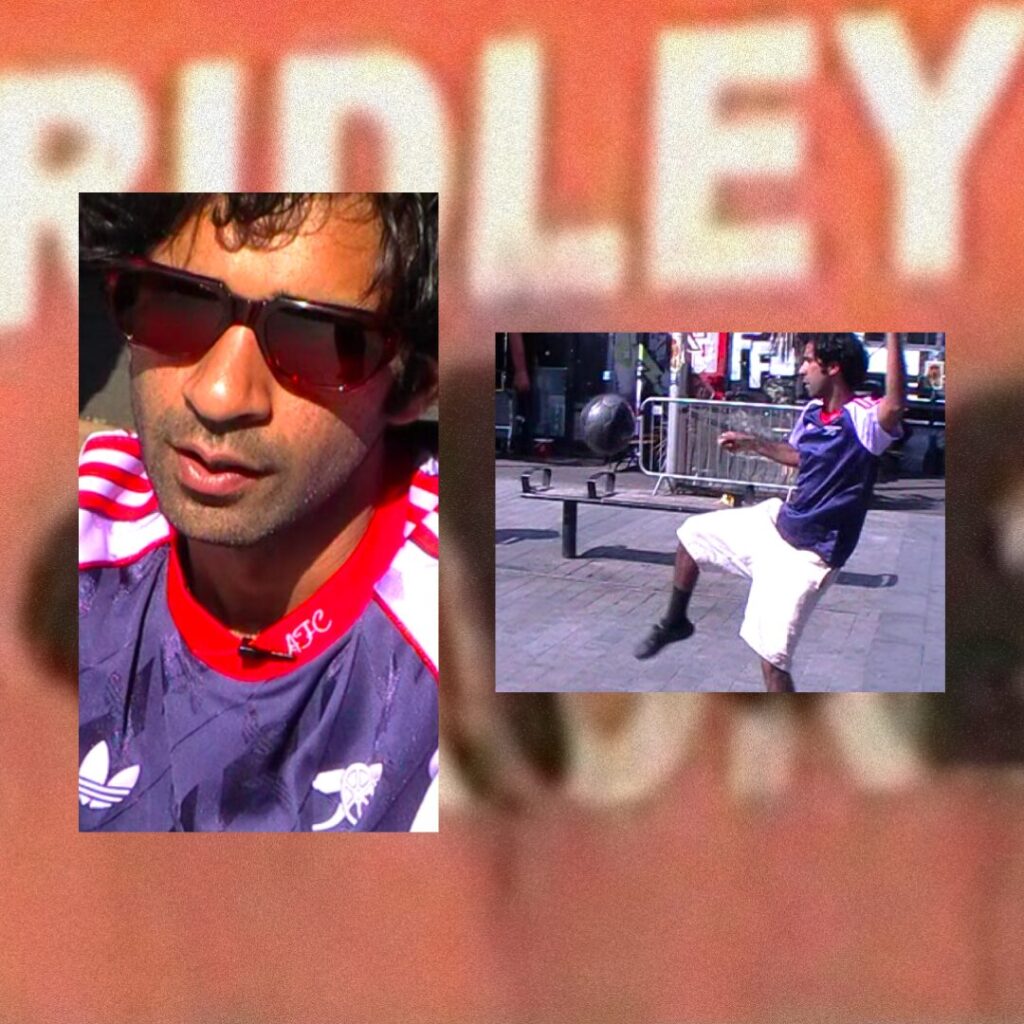
Last year you celebrated 100 episodes of Haseeb Iqbal World. But to take it back a bit, what did you initially want to achieve on radio?
When I got onto Worldwide, one thing Gilles really encouraged me to do was place an emphasis on the speaker. Interview people and really collect the contents of the culture. I find it so strange when I go to radio stations around the world and do a little show and they’re like, ‘wow, no one’s picked up the microphone in ages.’ That’s not really a radio show! We can’t be shy of the microphone. But that was something that I dug deep into. I would bring in guests, I would research them deeply and have an incredible chat about their history, their life and their craft.
When I got the breakfast slot, it offered a different side of me. I could do it every week. And it wasn’t just a two-hour deep dive with a person. You could actually get a bit of my personality. I could tell you the stories of my week, do specials and zoom into certain historical periods. I love the serious element of radio but I also love the jokes and the light hearted nature of it. Just the messing about, chatting to the chat rooms and all of that.
How would you describe the course of your journey so far?
It’s been really slow and I think that’s been a really good thing. I’m still young but when I started, I was even younger. It started to get to a new level of big in that I’m now going abroad. Now I get people that recognize me and listen to the show. Which is a mad feeling, but I can deal with it because it makes sense, because it’s taken so long. When I did student radio and no one was listening, that meant that I was falling in love with the actual craft of it. The minute two people listened, it was like, ‘wow, this is incredible.’ So I’m so grateful for the fact that it’s not been an overnight viral thing.
Right now, what we need in this wild world is to keep creating spaces that will bring people together to exchange human perspectives on the ground. Away from the algorithm. Through feelings, through humanly made music. Whether that’s digitally or on vinyl or with instruments. Bringing people into rooms and taking people to radio shows, where the long form can exist.
Haseeb Iqbal World has very much taken on a life of its own, incorporating radio and events via Studio Crumb. How has it been building that brand?
It’s been cool, man. I want to give a big shout out to my collaborator, Kavan Singh, who helped me build the website. It was his ambition and fearlessness in creating it that was really important for its inception. He helped code the website and we kind of got together, spent a few months building, coding, engineering and then launching it. It meant that we could start with fresh wings and a real excitement. It was just about the space for me to continue to express myself, and for new communities to arrive.
I can often forget that radio has an impact. Maybe because it’s me in my room just talking to myself. You hope people enjoyed the show but then there are mad moments when people come up to me that I’ve never met and they’ve got so much to say about the shows and about the tone and approach. That always really gets me. Recently, this girl who is doing her final year university project told me she decided to profile me. I asked why and she said she listens to the show every week and has come to Studio Crumb so many times. To get that external form of appreciation just reminds me that it’s going beyond the world that I know. That’s the magic that radio has.
Talk to us about the listening sessions you curated at Devon Turnbull’s Listening Room at 180 Studios. What did it involve and how do you reflect on the experience?
I actually pitched it to 180 Studios originally, about a year ago. One of the members of the team showed me around the Reverb exhibition just before it opened. They showed me the incredible listening room created by Devon Turnbull, who has redefined the modern day soundsystem experience through creating intentional, engaged listening rooms. I had the idea of doing seated listening performances, where 35 people sit down in silence for an hour and a half and come and listen to a theme of music. Then I chronicle that story through records and words, talking about the history of bringing it together. We started with the Blue Note special, and then we did a Jah Shaka special and a Pakistani cinema vinyl special. We’ve done Lover’s Rock, Sun Ra and Pharoah Sanders and this idea of songs of resistance, Pakistani classical music, female Jazz.
I think that space will go on in years and decades to come to be remembered as quite a revolutionary cultural space within London. Because essentially, what it’s done is it’s reminded people that you can engage with the music in silence and it can be healing and meditative.
One of the things that we can forget when we go to a listening bar and we’re all talking to each other, or we go to a club and everyone’s really loud, is actually there’s so much magic in people actually just stopping, pausing and submitting to the space that they’re in. When we do that, I truly believe that the healing properties and the feelings that we get are amazing, and we can process really complex emotions, birth these incredible dreams, and feel what we’ve got to feel. The listening sessions also have been an amazing opportunity for me to really give justice to certain movements and stories and histories that can be so forgotten.
It sounds like when you listen to music, you don’t just hear music. You hear stories and context from generations.
I’m quite curious about music and where it comes from. What the movements are and what the feelings were. The overlap of resistance and sounds of upliftment. How music has been a place where people have been able to deal with their own suffering and find a sense of joy. I just love tapping into that. That’s the thing that’s really magical, using music and the context around it to understand where it came from.
You’re also promoting your first film documentary Haseeb Iqbal Presents: Vin Gordon. What can you tell us about it?
The documentary is a long form chat with Reggae legend Vin Gordon, who’s someone who has not gotten all of his flowers, in my opinion, that he deserves. He’s an incredible composer, writer, trombonist and he played with Bob Marley for 13 years and worked with Lee ‘Scratch’ Perry, Augustus Pablo and King Tubby. I think he played on more records than anyone through that 1960s-1980s period of Jamaican music. He also came over to the UK and was a really big part of the soundsystem movement, making music that Jah Shaka would play. So it was a story of me and my friend tracing him to a village in France and going to interview him, and getting to know his story.
I’ve done a lot of radio documentaries, and I’ve told a lot of stories via the radio, which is actually a great way to start. In order to compel a crowd for two hours through that medium, it means you need to have personality. Then by the time you get to the screen, you can handle that. I can stand in front of the camera and tell a story without stuttering, because I’ve done that for years on the radio.
You travel all over the world also spreading musical messages. What lessons have you taken from those experiences?
I’ve been really blessed as of late to travel a lot more. Playing music in Mexico, Australia, France, Germany, The Netherlands, packing my bag of records, taking them out of my room and being able to encounter new people and cultures through music. It’s such a privilege. Especially like Mexico and Australia, those were two places where I was really blown away by the forthcoming, appreciative, engaged nature of the audiences. They would really come up to you at the end and say what they felt. I go over there to bring my London vibe to them and then I can go and see what they’re about and try and bring their energy back here, through the decks and the performances and through the radio stories too.
I try to always spend a bit more time where I’m playing, rather than just a day in and out, and use it as an opportunity to really encounter culture. Record collecting is a perfect entry point to that. Entering a record shop and spending a bit of time there talking to the owner and asking what the local music history is about. When you appreciate the foundations, it’s just so inspiring and it really helps you understand people.
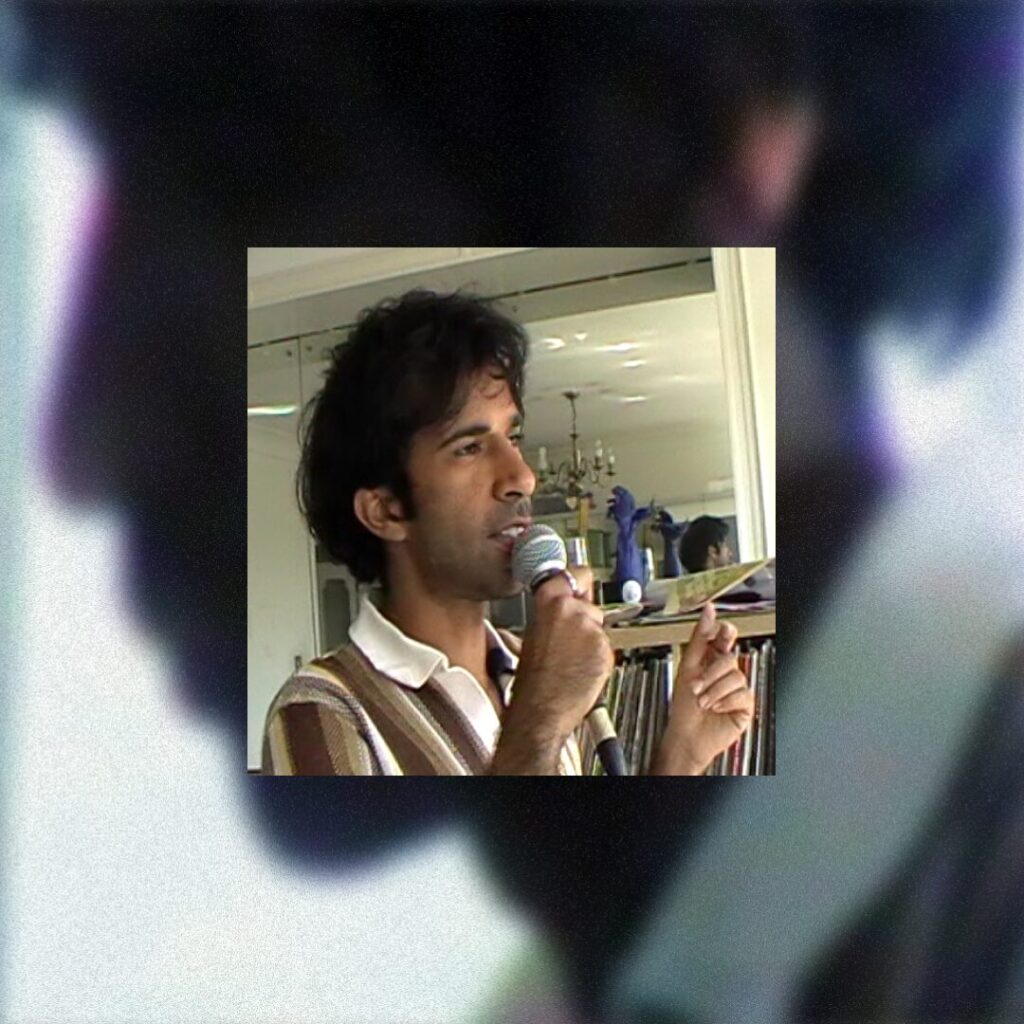
What are some aspects of your DJ, radio and curation career that you’ve come to appreciate more?
I think I’ve learned that it doesn’t matter how great your DJ sets are, how cool your radio shows are, or how interesting your concepts are. If people aren’t engaging, then it has no impact. I’m sure a brand new, young, unknown DJ has done some of the best sets around and because the crowd have just been chatting, it’s never been appreciated because it was overlooked at that moment. I’ve really come to appreciate the importance of an intentional space. Creating a space where people really tune in, sometimes by having to say that, and sometimes by showing that.
With Studio Crumb nights, I mostly play all of the five hours myself and when the first people come in and start dancing, the magic is there. Everyone who follows follows that template. And sometimes when the first people that come in are just talking, it can just change everything.
Sometimes I have to come off the decks and say to them, ‘hey, if you want to chat, do you mind just chatting at the bar?’ It can be quite shocking for people where they can be like, ‘you’re telling me what to do on my Friday night’ which I can understand. But it’s about appreciating the club as a theater rather than a hedonistic bar. We have a bar in the smoking area for socializing, which is a great part of club culture. Then we’ve got the dance floor as a space to immerse yourself into the sound. I’ve come to really appreciate that.
Is there a difference in the way you approach a DJ set and how you approach a radio show?
The radio show gets a lot more active preparation. Picking out my tunes, learning the history, the stories and working out the connections. But then also there’s the free flowing nature of just chatting and telling stories and catching jokes and having fun with it. But my best radio shows are the ones where I prepare what I’m going to play. With DJ sets, I might know the first tune I’m going to play but I will never know anything other than that. Even if it’s a really big set, I won’t know. The vinyl thing is a really important part of it.
I’ve got love for all DJs and I’m grateful for the avenues through which we can play music, including digital. But for me, the act of touching, feeling and spinning the vinyl and going through it is actually how I can play really well. When I’ve got a screen in my face flashing and twisting nobs, I just can’t play well and it doesn’t help me play properly. I don’t want to know all the information of how much more of a song is left, what BPM it is and what tune I can play it with. I’d rather go off feeling than information.
“What we need in this wild world is to keep creating spaces that will bring people together.”
Tell us about some of your pre-set rituals before you head to the stage.
For my Studio Crumb nights, because I do them mostly myself, when I’m playing from 10 till three, I have to have eaten well that day. Get a plate of food, have the sea moss. Drink lots of coconut water, lots of water as well. Get the fruit down me and just enter it feeling good. You cannot come off a big night, be really tired and think you can get through it. I always have the Babylon soundtrack in my bag, that’s my little ritual, even if I’m not playing it. It just gives me tons of comfort and was one of the first records I ever bought. I never go on my phone when I’m DJing in a club, only to check the time. I just like to enter the trance of the dance, man.
What role has Mixcloud played in your journey?
Mixcloud has been great because it’s really allowed people to tune into my shows who’ve not been able to listen live. It’s given me an opportunity to get the show straight up and allow people from all around the world to tune in within minutes. That’s a really special thing, something that you don’t have with a club set. You’re confined to the room and the room is beautiful but the power of radio and internet radio is that instant sharing of music. Within a few hours, you’ve got people from Canada, Mexico, Brazil, Australia, Japan and Morocco listening to it, sending their messages and appreciating it. I’m really grateful for Mixcloud. That’s where all of my radio shows that I’ve ever done are, so it’s a great archive.
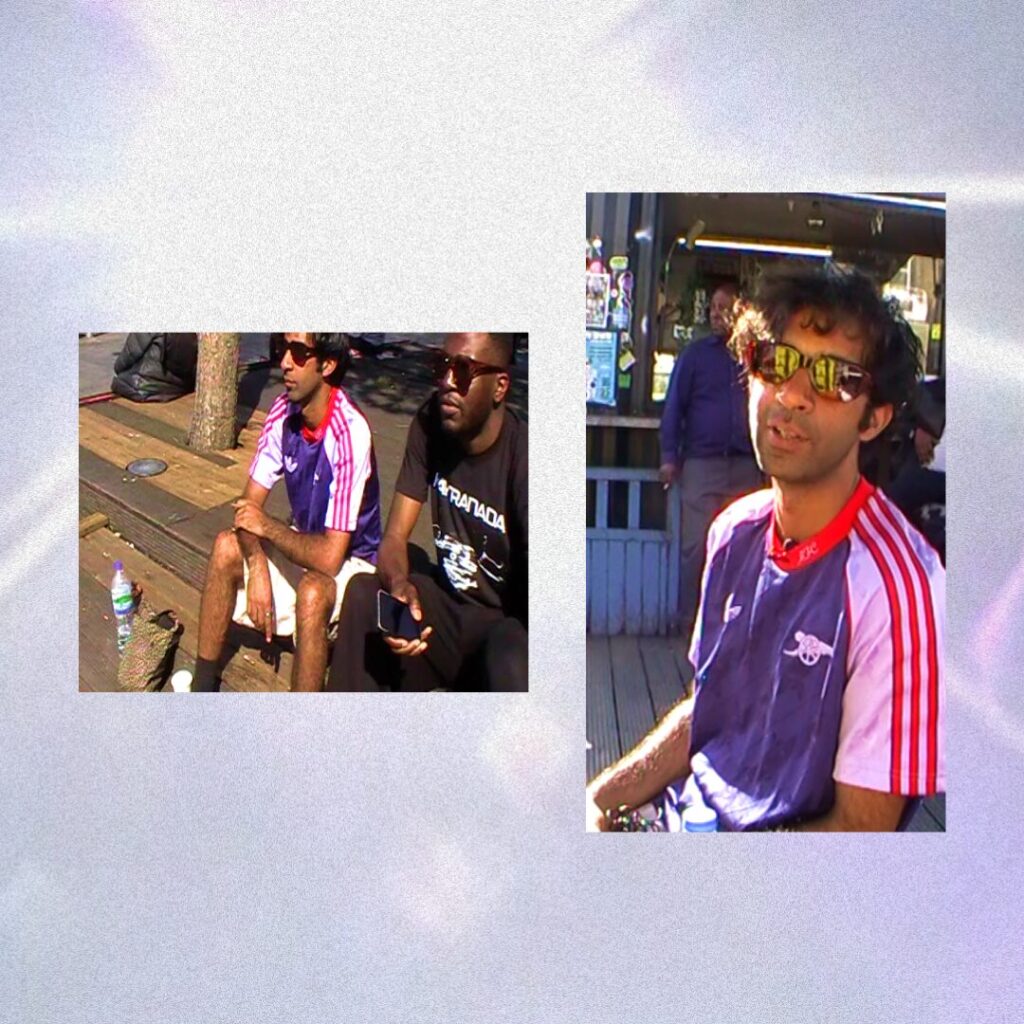
What are some of your career highlights so far?
Definitely the Sunday of We Out Here 2022. I was hosting the Main Stage, and I went from introducing my favorite live musician, Kahil El’Zabar from Chicago, to running over from the Main Stage to the Rhythm Corner stage where I warmed up for my greatest hero, Jah Shaka, and I played before him. He changed my life and transformed the way that I play. He’s the only artist I would cancel my own gigs for, to make sure I could be at his gigs. What he did with soundsystem culture was transformational not only for me, but for literally millions of people.
Then running back over to the Main Stage to watch Pharaoh Sanders do what was his final ever live show, and to outro him, before then doing a warm up set for Azymuth. To warm up for my hero and then go and see another hero is just something that I’m so grateful for. That really gave me wings.
Then on top of that, doing the Pakistani cinema vinyl listening session at 180 Studios was a really important moment. I think going over and finding this pride in my heritage across the last few years has been really amazing. Going over to my motherland and collecting these records that basically don’t exist in Europe and they’re part of this history that would be lost if it wasn’t for the physical vinyl. It’s something that really fueled me to keep on with that track of learning more about my own background and sharing it with people over here.
What’s next for Haseeb Iqbal?
We’ve got a few more film documentaries coming in and I’m hoping to work with some more people. I want to do more documentaries, travel and share more stories that are sensitive and done well, and really push that side of things. I want to keep on with the listening sessions and publish some written reflections on my travels. Some poetry and a couple other book projects that I’ve been working on. But mostly, I want to keep improving as a person, keep being the best that I can be for myself, for those around me, and keep stepping into the city and beyond being as present as possible.
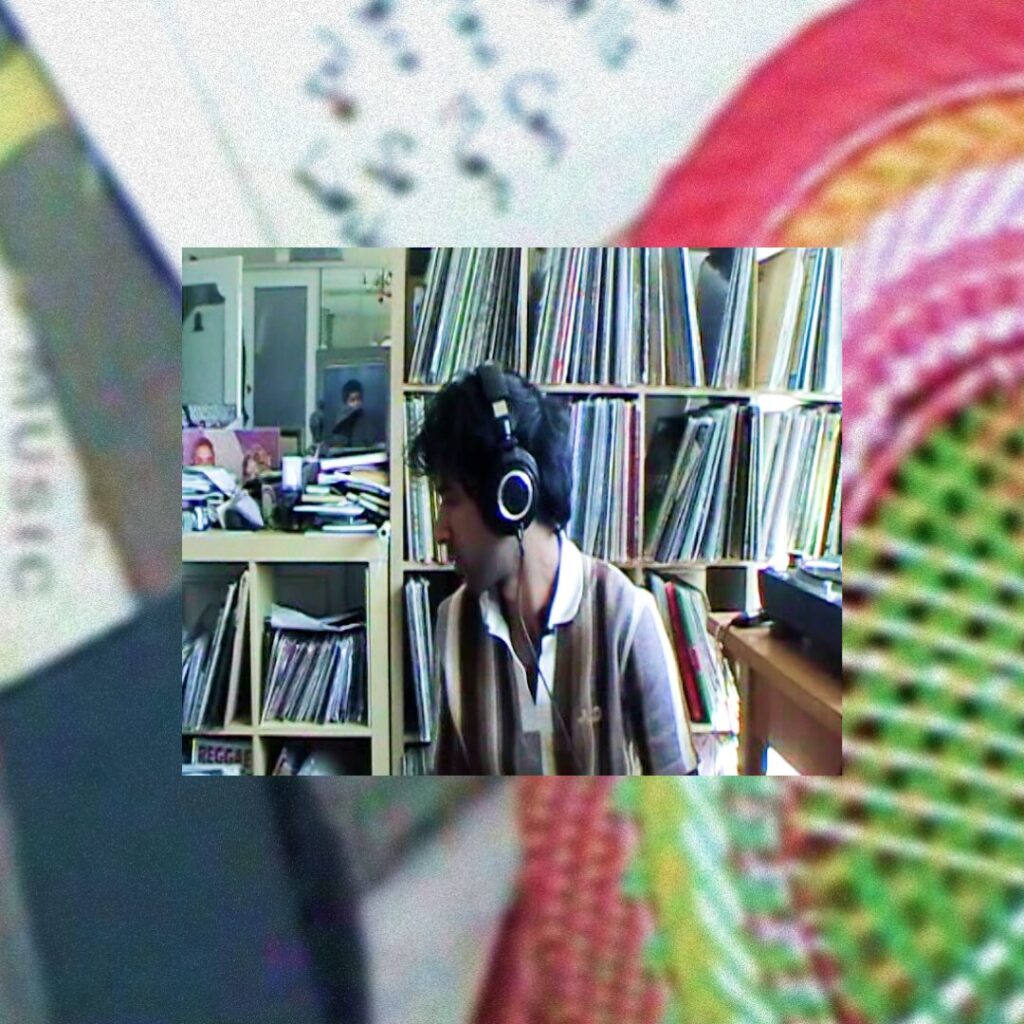
Follow Haseeb Iqbal on Mixcloud.
